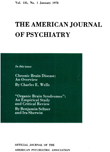THE SIGNIFICANCE OF ALPHA VARIANTS IN THE EEG, AND THEIR RELATIONSHIP TO AN EPILEPTIFORM SYNDROME
Abstract
1. Evidence has been presented to show that the cerebral psychomotor patterns of Gibbs, Gibbs and Lennox are related to certain variations of the 10-cycle or alpha rhythm of the brain, which have been termed alpha variants. The most common variants consist of a halving or doubling of the alpha rate.
2. Even in cases of known psychomotor epilepsy the amount of the alpha variants recorded in the EEG between attacks may vary widely both among and within individuals, but practically all such patients show traces of the variants between seizures.
3. There is a high incidence of alpha variants in certain other conditions, notably psychoneurosis and idiopathic epilepsy. Their presence in the so-called psychoneurotic group shows a high correlation with a symptom complex that includes cranialgia, episodic changes in levels of consciousness, and emotional and vasomotor disturbances.
4. A high incidence of alpha variants among patients with grand mal epilepsy has been noted. The alpha variants may be correlated in these cases with altered states of consciousness (which cannot be identified electroencephalographically with petit mal), or with neurotic traits superimposed on the major epilepsy. It is concluded that mixed epilepsy of a grand mal—psychic variant type is of frequent occurrence.
5. The alpha variants are not pathognomonic of the epileptiform states. The significance of their appearance in the EEG without the accompanying symptom complex, as in the case of a small proportion of presumably normal individuals, has not yet been elucidated.
6. The alpha variants are of diagnostic assistance in cases where the neurological findings are essentially negative, and where the EEG is otherwise within broad normal limits. Under these circumstances, their presence in the EEGs of patients with vasomotor instability (cranialgia, dizziness, etc.), emotional disturbances of an episodic nature, or changes in the state of consciousness, indicate that the condition may be related to an epileptiform syndrome, rather than to a purely psychosomatic etiology.
7. The term psychomotor epilepsy is inadequate to describe the entire range of psychic variants in the epileptiform syndrome, and in our opinion should either be replaced by a more descriptive term, or its use restricted to conditions in which motor manifestations of a bizarre nature are present.
Access content
To read the fulltext, please use one of the options below to sign in or purchase access.- Personal login
- Institutional Login
- Sign in via OpenAthens
- Register for access
-
Please login/register if you wish to pair your device and check access availability.
Not a subscriber?
PsychiatryOnline subscription options offer access to the DSM-5 library, books, journals, CME, and patient resources. This all-in-one virtual library provides psychiatrists and mental health professionals with key resources for diagnosis, treatment, research, and professional development.
Need more help? PsychiatryOnline Customer Service may be reached by emailing [email protected] or by calling 800-368-5777 (in the U.S.) or 703-907-7322 (outside the U.S.).



